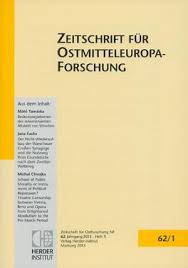Polnische Ukrainediskurse der Zwischenkriegszeit
Polish Discourses on Ukraine in the Interwar Period
Author(s): Ralph SchattkowskySubject(s): Political history, Social history, International relations/trade, Interwar Period (1920 - 1939)
Published by: Verlag Herder-Institut
Keywords: Poland; Second Republic; minorities; Ukraine; nationalities; eastern policy; prometheism; nationhood;
Summary/Abstract: The relationship with Ukraine and the Ukrainians played a role in all phases of planning and creating modern Polish statehood, in particular with regard to the territorial dimension of the new state to be created in the East. The ‘Ukrainian question’ was also raised in terms of the Ukrainian population, as part of the minority problem of the Second Polish Republic. Last but not least, relations with Russia, an existential problem from a Polish perspective, were also affected, contributing to their exposed position in both internal and external politics. The political camps in Poland addressed the ‘Ukrainian question’ with very different degrees of intensity and, especially, continuity. The issue was much more of a priority for the national democrats than for the conservatives and agrarians—the approach was far from consistent. Only the socialists (even before the First World War) had thoroughly dedicated themselves to the national question in general, and the Ukrainian problem in particular. For them, it was clear that Polish independence and the establishment of a sovereign state were closely linked to resolving the ‘Ukrainian question’. This was the only productive way to improve Poland’s international position, and, above all, her relationship with Russia. The debates on the Ukraine problem were conducted in relatively small elite circles, marginalized in the legislature and hardly affected political practice. Inspired by the catchwords ‘autonomy’ and ‘self-government’, extraordinary trains of thought emerged, which had genuine potential to resolve urgent issues of nationality politics, even beyond Poland’s borders. Despite the profound discursive deliberations about all the problems associated with the ‘Ukrainian question’, and, especially after 1926, the actually available political resources to realize the proposed solutions, a state concept for implementing them never really emerged. The model of social or even state coexistence always remained unfocused and, ultimately, the political will to implement it was lacking.
Journal: Zeitschrift für Ostmitteleuropa-Forschung
- Issue Year: 66/2017
- Issue No: 2
- Page Range: 180-212
- Page Count: 33
- Language: German

